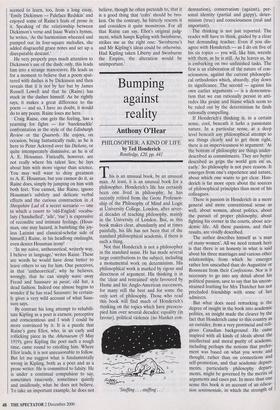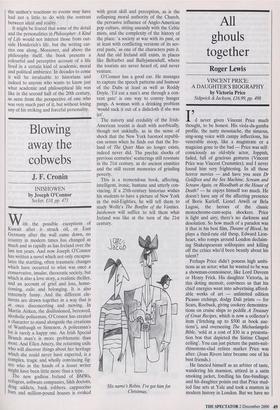Bumping against reality
Anthony O'Hear
PHILOSOPHER: A KIND OF LIFE by Ted Honderich Routledge, £20, pp. 441 This is an unusual book, by an unusual man. At least, it is an unusual book for a philosopher. Honderich's life has certainly been one lived in philosophy; he has recently retired from the Grote Professor- ship of the Philosophy of Mind and Logic at University College, London, after sever- al decades of teaching philosophy, mainly in the University of London. But, as this book makes clear, abundantly and at times painfully, his life has not been that of the standard philosophical academic, if there is such a thing.
Not that Honderich is not a philosopher in the standard sense. He has made several large contributions to the subject, including a monumental work on determinism. His philosophical work is marked by rigour and directness of argument. His thinking is in the 'clear and restrained' style favoured by Hume and his Anglo-American successors, for many still the best and for some the only sort of philosophy. Those who read this book will find much of Honderich's thinking on the topics which have preoccu- pied him over several decades: equality (in favour), political violence (no blanket con- demnation), conservatism (against), per- sonal identity (partial and gappy), deter- minism (true) and consciousness (real and important).
The thinking is not just reported. The reader will have to think, guided by a clear but demanding teacher. Even if you dis- agree with Honderich — as I do on five of his six topics — you will, like him, wrestle with them, as he is still. As he leaves us, he is embarking on two unfinished tasks. The first is an elaboration of the nature of con- sciousness, against the current philosophi- cal orthodoxies which, absurdly, play down its significance. The second — against his own earlier arguments — is a demonstra- tion that we can rationally persist in atti- tudes like praise and blame which seem to be ruled out by the determinism he finds rationally compelling.
If Honderich's thinking is, in a certain sense, cool, beneath it lurks a passionate nature. In a particular sense, at a deep level beneath any philosophical attempt to see things clearly and to get them right, there is an imperviousness to argument: 'At the bottom of philosophy are things under- described as commitments. They are better described as grips the world gets on us, early.' So philosophy is not pure reason. It emerges from one's experience and nature, about which one wants to get clear. Hon- derich is far more open about the sources of philosophical principles than most of his colleagues.
There is passion in Honderich in a more general and more conventional sense as well, about women, about politics, about the pursuit of proper philosophy, about fighting his corner in the courts, about aca- demic life. All these passions, and their results, are vividly described.
The author describes himself as 'a man of many women'. All we need remark here is that there is an honesty in what is said about his three marriages and various other relationships, from which he emerges rather less unscathed than do Augustine or Rousseau from their Confessions. Nor is it necessary to go into any detail about his political passion, save to say that his uncon- strained loathing for Mrs Thatcher has not precluded friendship with some of her admirers.
But what does need remarking is the degree of insight in the book into academic politics, an insight made the clearer by the fact that Honderich came to this country as an outsider, from a very provincial and reli- gious Canadian background. He came inspired with all kinds of ideals about the intellectual and moral purity of academe, including perhaps the notions that prefer- ment was based on what you wrote and thought, rather than on connections and self-promotion, and that academic depart- ments, particularly philosophy depart- ments, might be governed by the merits of arguments and cases put. In more than one sense this book is an account of an educa- tion sentimentale, in which the strength of the author's reactions to events may have had not a little to do with the contrast between ideal and reality.
It might be feared that some of the detail and the personalities in Philosopher: A Kind of Life would not interest those from out- side Honderich's life, but the writing car- ries one along. Moreover, and above the philosophy itself, the book presents a colourful and perceptive account of a life lived in a certain kind of academic, moral and political ambience. In decades to come it will be invaluable to historians and indeed to anyone who wants to know just what academic and philosophical life was like in the second half of the 20th century, as seen from the perspective of one who was very much part of it, but without losing any of his striking and forceful personality.



















































































 Previous page
Previous page